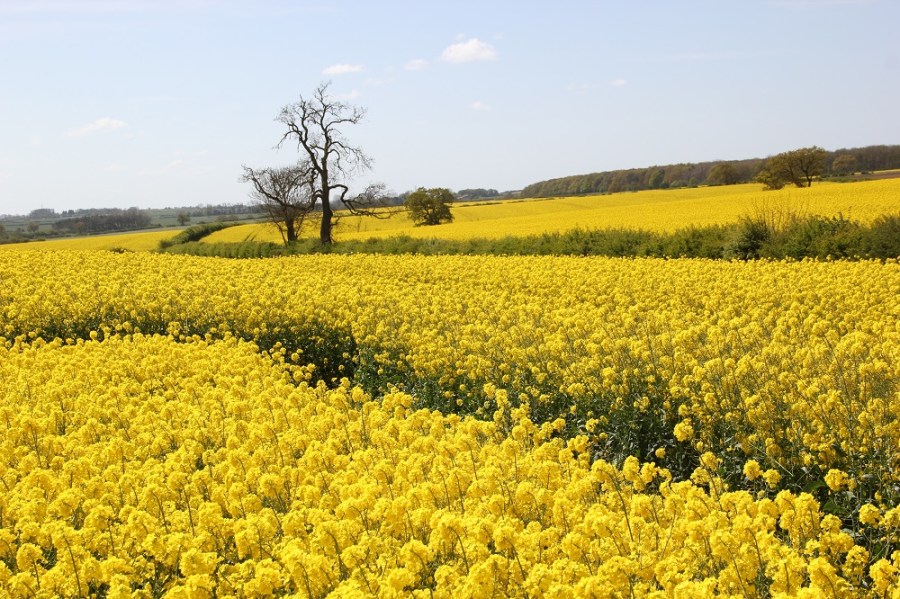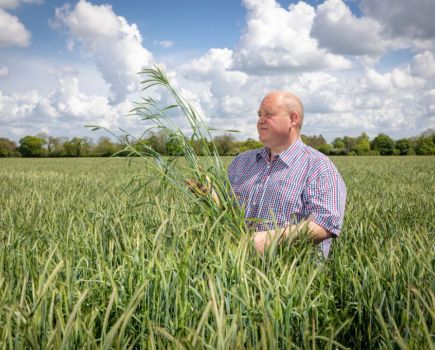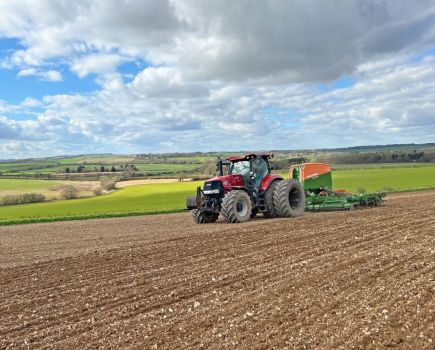In a world where vigour alone can win the race for an oilseed rape variety, Dekalb’s DK Expedient puts itself as a frontrunner. CPM finds out what’s grabbing attention.
It’s arguably the fastest variety to get out of the trap.
By Melanie Jenkins
Dekalb has made a name for its oilseed rape varieties, with several that exhibit growth habits distinct from other varieties, on top of its well-known pod shatter and double phoma stem canker resistance. So what’s the appeal of one its latest varieties – DK Expedient? True to the reputation of the brand, word is Dekalb has done it again, breeding a variety that’ll jump out of the ground faster than any DK variety before it.
DK Expedient has a stand-out growth habit and speed of development, says Lee Bennett at Openfield. “The benchmark for fast growth among current DK varieties is DK Extrovert and DK Expedient supersedes that. Its autumn growth and development are rapid and – with the desire from growers to drill later for blackgrass and cabbage stem flea beetle pressures – that’s a bonus.”
This get up and go is vital for growers, and is a key aspect of DK Expedient, says Geoff Hall at Dekalb. “Growers want OSR which establishes quickly to get away from flea beetle; and this meets growers’ needs.”
Jim Carswell at Agrii agrees. “Its initial fast growth results in a leafy canopy which covers the ground quickly and seems to have helped deter pigeons last autumn, while its early start to growth in spring compared with many other varieties has been had been clearly seen in the cold conditions experienced in early 2018.”
Growers don’t need to be concerned that this will require a more comprehensive PGR programme, adds Jim. “Despite fast development and growth, canopy management should still be straight forward following GAI principles.”
Lee likens DK Expedient to DK Expower in terms of growth habit but with stiffer straw than both it and DK Extrovert. “With DK Expedient Dekalb has fixed a lot of the weakness of these two good varieties.”
Everything David Bouch at Hutchinsons has seen and heard of DK Expedient so far, demonstrates that its autumn growth is very good, with equally good vigour in the spring. “I would be keen to see more varieties like this. This season might be where it proves itself if it behaves as it’s designed to after a more challenging winter.”
Anyone growing it will notice that it’s similar to Excalibur in development and growth habit, but it’s performance is much higher and it carries the full package of DeKalb traits, says Matthew Clarke, breeder at Dekalb. “I picked it up in the breeding trials programme at a quite early stage and realised we had an interesting variety.”
DK Expedient suits growers looking to sow later into cooling or tougher soils, who want that extra vigour and get up and go, explains Lee. “For sandy soils, it has a more exploratory root system, so it’ll lend itself to this situation.”
Its straw and standing power are also suited to thinner chalk and wold type soils, says Jim. “While most varieties on the current AHDB Recommended List have ratings of 4 or 5 for maturity, DK Expedient is rated 6 so it’s earlier and could help farmers spread harvest.”
David Bouch feels that DK Expedient’s yield will be a step up from DK Exalte and it may show that potential this autumn and beyond.
The variety also has good oil content and is a solid all-round performer, adds Jim. “In terms of yield, in our trials in Yorks it’s on a par with DK Exalte but it offers more vigour.”
David Leaper at Agrii has seen DK Expedient in Agrii trials for the past two years and agrees with Jim. “In terms of hybrid performance, it’s right at the top for gross output. The question we had was, if you’re already growing DK Exalte, why grow DK Expedient as well?” he asks.
“The unique difference is how fast DK Expedient is to get away in the spring and it’s arguably the fastest variety to get out of the trap. This is particularly useful to offset larval infestations in the spring.”
While the variety shouldn’t be drilled too early, when drilled in Aug at 40 seeds/m², there were no issues with lodging and indeed some growers choose fast developing varieties drilled early to help combat the effects of CSFB, explains Jim.
Dekalb’s pod shatter resistance is now a prerequisite with its varieties and DK Expedient is no exception says Lee. “And the double phoma resistance negates the need to be pressured around spray timings.”
DK Expedient falls into the middle band for verticillium wilt resistance, according to David. “It’s average: Not weak but not the best either.”
The only thing to be mindful of is the light leaf spot resistance, but it’s good enough, Lee adds. “It’s the only minor negative I could find if forced to look for one, and at a 5 isn’t a detriment to the variety, but it’ll need slightly more attention than some other varieties.”
However, this LLS question means the variety could be more suited to growth south of the Scottish border, Jim suggests. “I’m more comfortable with varieties scoring over 6 in the North but it can be grown, just with a more robust programme. It will want a late autumn fungicide and one in early spring and maybe another at yellow bud stage, depending on the pressures.”
Though there was only a limited amount of seed available last season, there was some DK Expedient grown commercially and Lee has seen it extensively in trials. “I’m familiar with it from Openfield trials and from everything else I’ve seen, I’m quite excited by it.”
There’s good availability of seed this year from a number of seed merchants, says Geoff. “Dekalb is focusing the DK Expedient offering on establishment strength for farmers, with a unique establishment pledge (see panel on pxx). This’ll help growers with the financial risks they’re having to deal with in the OSR crop and will be rolled out to growers with DK Expedient.”
Although the variety missed out on recommendation to the RL, that should be of no detriment to DK Expedient, says Lee. “Irrespective of the RL, Dekalb has a loyal following of growers and this won’t prevent it commanding a good market share and doing very well. In our early order book it’s currently the top seller and it hasn’t been a difficult proposition to present to farmers.”
DK Expedient should naturally fill the space left by DK Extrovert – which was widely liked by farmers – as it has a higher yield, says David Bouche.
According to Lee, there’s nothing worse than looking at an OSR crop that refuses to grow, which is a concern farmers won’t get with DK Expedient. “The thing that makes it most unique above all other varieties is its growth habit. But it’s a good combination of the ‘nice-to-haves’ – the phoma and pod shatter resistance and stiff straw, as well as its precocious autumn growth habit.”
The Dekalb family of OSR varieties provide very appealing traits for growers, adds David Bouch. “They have a large share of the hybrid market, and even though few make the RL, the reputation precedes new varieties. DK Expedient is the next stepping stone and I think it will have an important part to play this season and in coming ones.”
So confident are Dekalb breeders in the establishment and early development abilities of
DK Expedient that the company is introducing an innovative support scheme for first growers of the variety in the coming season.
Pledge aims to underpin establishment confidence
Through DK Expedient distributor partners, the Dekalb Establishment Pledge will offer 2018 growers of the new variety attractive discounts on future seed purchases wherever plantings made under reasonable risk conditions have to be destroyed for failure to establish.
“DK Expedient is one of the most robust high performance varieties we’ve ever bred,” explains Dekalb’s Mark Shaw. “Highly vigorous establishment and particularly rapid autumn and spring development give it the ability to grow away from early season challenges that would defeat lesser varieties.
“We believe the variety gives growers across the country the greatest possible confidence in reliable winter OSR establishment and we’re putting our money where our mouth is introducing it with our first-ever Establishment Pledge.”
The scheme’s being designed with Dekalb’s approved distributor partners to minimise paperwork and small print, he stresses. “Of course, we also have to ensure any claims are legitimate and don’t involve wholly unreasonable establishment conditions beyond the ability of any OSR crop.”
The Dekalb Establishment Pledge will require registration of DK Expedient seed purchases with the scheme ahead of drilling and simple confirmations of field locations, assessments of key risk level at planting and evidence of any crop destruction. Credit notes for validated claims will be provided in the form of vouchers for use against 2019 winter OSR seed supplies with the particular distributor.
Making strong progress in Northumberland
James Fairbairn is currently growing his first crop of DK Expedient at Whitton Hill Farm, Milfield, Northumberland, and hopes to see it continue looking well into the summer. “I’ve grown DK Extrovert for a number of years and I’m just looking for a replacement that’s fast growing with good disease ratings and strong agronomics,” he explains.
“It needs to be quick to establish true leaves to get away from slugs, and the pod shatter resistance is important too, though LLS is the main problem, not phoma.”
Farming 310ha, James has 3ha of DK Expedient in a rotation of wheat, spring oats, wheat, barley, and OSR. It was direct drilled on 24 Aug 2017 with a Claydon Hybrid, after winter barley, at 50 seeds/m², with 100kg of diammonium phosphate. “It went in on heavier land so we used the top end of the seed rate.”
The DK Expedient went in alongside DK Exalte and came up slightly quicker in the autumn. “It came up well and then didn’t look back – it just took off,” explains James. He has had a few issues with lodging in DK Exalte and hopes that DK Expedient will perform better.
The crop had tebuconazole for PGR and disease, and boron at the end of Oct. “LLS is the main issue around here and there’s quite a bit around at the moment. I applied prothioconazole in mid Mar but DK Expedient is no different from the other varieties I grow.”
DK Expedient behaved similarly to DK Exalte coming into the spring, he explains. “It woke up fairly quickly despite being on higher ground and after a foot of snow.”
James would like to get 5t/ha when it comes to harvesting DK Expedient, but that’s above his farm average. “It needs to yield over 4t/ha though. I’m happy with it so far and how it has coped with the poor winter we’re had.”
DK Expedient at a glance





